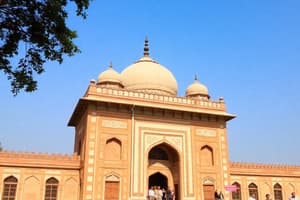Podcast
Questions and Answers
What emotion does Aurangzeb primarily express towards his father in the passage?
What emotion does Aurangzeb primarily express towards his father in the passage?
- Grief and remorse for his actions (correct)
- Indifference to the situation
- Anger for being usurped
- Pride in his accomplishments
What does Aurangzeb lament about in relation to his reign?
What does Aurangzeb lament about in relation to his reign?
- The betrayal of his allies during his ascent to power
- His sacrifice of peace of mind for royal stature (correct)
- The deterioration of his kingdom's power
- His memories of a simpler life without kingship
What specific regret does Aurangzeb express regarding his brother?
What specific regret does Aurangzeb express regarding his brother?
- He wishes he had taken the throne instead
- He regrets their rivalry in military confrontations
- He regrets not supporting him during the reign
- He feels guilty for the death of Dara, his brother (correct)
What symbolic action does Aurangzeb take regarding the crown?
What symbolic action does Aurangzeb take regarding the crown?
What does Aurangzeb imply about the nature of kingship at the end of the passage?
What does Aurangzeb imply about the nature of kingship at the end of the passage?
What does Aurangzeb's gaze toward his father signify?
What does Aurangzeb's gaze toward his father signify?
Which theme is illustrated by Aurangzeb's reflection on his past?
Which theme is illustrated by Aurangzeb's reflection on his past?
What does Aurangzeb's mention of the 'baleful meteor's gleam' represent?
What does Aurangzeb's mention of the 'baleful meteor's gleam' represent?
How does Aurangzeb view his own actions towards his father?
How does Aurangzeb view his own actions towards his father?
What is implied about Aurangzeb's character through his tears?
What is implied about Aurangzeb's character through his tears?
What is suggested by Aurangzeb's reference to being 'faint with boding fears'?
What is suggested by Aurangzeb's reference to being 'faint with boding fears'?
In what manner does Aurangzeb describe his relationship with his brother, Dara?
In what manner does Aurangzeb describe his relationship with his brother, Dara?
What does Aurangzeb's self-identification as a 'parricide' indicate?
What does Aurangzeb's self-identification as a 'parricide' indicate?
How does Aurangzeb's outlook on kingship evolve throughout his reflection?
How does Aurangzeb's outlook on kingship evolve throughout his reflection?
What does Aurangzeb's wish to 'fling the dear bought crown' signify?
What does Aurangzeb's wish to 'fling the dear bought crown' signify?
Flashcards
Aurangzeb's remorse
Aurangzeb's remorse
Aurangzeb, after killing his father, experiences deep regret and sorrow.
Usurper's guilt
Usurper's guilt
Aurangzeb, who seized the throne from his father, is haunted by his actions.
Monarch's deathbed
Monarch's deathbed
The excerpt describes a king's death scene where his son, Aurangzeb, is by his side.
Aurangzeb's despair
Aurangzeb's despair
Signup and view all the flashcards
Father-son conflict
Father-son conflict
Signup and view all the flashcards
Aurangzeb's guilt
Aurangzeb's guilt
Signup and view all the flashcards
Aurangzeb's actions
Aurangzeb's actions
Signup and view all the flashcards
The king's deathbed
The king's deathbed
Signup and view all the flashcards
The setting sun
The setting sun
Signup and view all the flashcards
Aurangzeb's regret
Aurangzeb's regret
Signup and view all the flashcards
The peacock throne
The peacock throne
Signup and view all the flashcards
Aurangzeb's plea
Aurangzeb's plea
Signup and view all the flashcards
Aurangzeb's guilt and shame
Aurangzeb's guilt and shame
Signup and view all the flashcards
Aurangzeb's future
Aurangzeb's future
Signup and view all the flashcards
Study Notes
The Monarch's Death and Aurangzeb's Remorse
- Aurangzeb, a usurper, is mourning his father's death.
- The setting sun illuminates the scene as the monarch lies on his bier.
- Incense burners emit low smoke.
- Aurangzeb holds the blade that won battlefield victories.
- Aurangzeb expresses remorse for his actions against his father.
Aurangzeb's Grief and Confession
- Aurangzeb laments his usurpation of the throne.
- He criticizes his own actions, questioning how he could raise his hand against his father.
- He wished for a different fate.
- He confesses to his father's cruel death and usurpation of his throne.
Aurangzeb's Self-Doubt and Fears
- Aurangzeb questions his own kingship.
- He doubts his sanity and displays sorrow.
- He's overcome by fear and doubts his abilities.
- He emphasizes his grief and doubts his decision to usurp the throne.
Aurangzeb's Guilt and the Past
- Aurangzeb acknowledges guilt and shame caused by war and conflict.
- He ponders the forces that influenced his rise to power.
- He questions the forces that influenced his actions.
- He reflects on the impact of his crimes, particularly the murder of Dara.
Aurangzeb's Despair and Acceptance
- Aurangzeb rejects the crown and acknowledges the inevitability of death.
- He displays a deep sense of despair and sorrow.
- He acknowledges the inevitable outcome of the conflict and death.
Studying That Suits You
Use AI to generate personalized quizzes and flashcards to suit your learning preferences.




